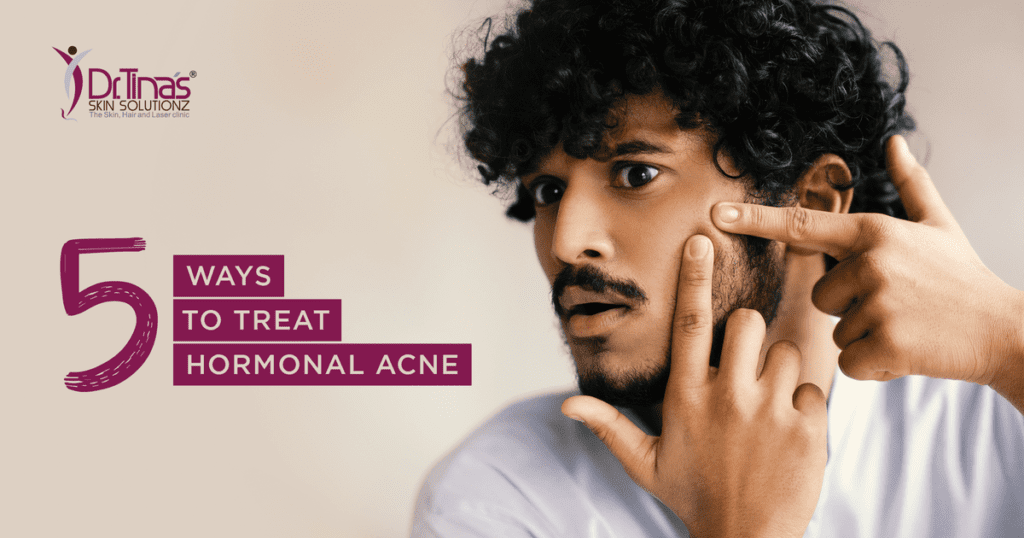5 Effective Ways to Combat Hormonal Acne

Acne is surprisingly common in adults, persisting well into your twenties, thirties, or even forties. This is primarily due to fluctuations in your hormones. Women, in particular, are more prone to hormonal acne, which affects over half of the female population. But what exactly causes it, and is there a way to manage it?
To answer the first question, hormonal acne arises mainly due to clogged pores triggered by an overproduction of sebum, which is influenced by hormonal changes. Breakouts caused by these hormonal shifts are indeed manageable!
However, if these measures don't help, you might want to consider booking an appointment at a reputable clinic to receive the best acne treatment in Bangalore.
Let's Explore 5 Ways to Treat Hormonal Acne
Identifying Lifestyle Changes That Truly Matter
Your current lifestyle habits might be contributing to your hormonal acne. Your daily choices can have a direct impact on your skin health. Did you know that improving your gut health can also improve your skin? Surprising, isn’t it?
Sleeping late or failing to hydrate adequately can significantly affect your skin, leading to various issues, including acne. Moreover, excessive stress can increase cortisol production, a hormone responsible for the body's fight-or-flight response. Elevated cortisol levels can lead to weight gain and skin inflammation.
Monitor Your Diet
Gut health often plays a pivotal role in maintaining healthy skin, the body’s largest organ. Eating foods that promote inflammation in your body can directly cause painful breakouts. High-glycemic foods, which are high in sugar, spike blood sugar levels, leading to inflammation. These types of food not only cause inflammation but also stimulate excess sebum production.
Low-glycemic foods help maintain stable glucose levels in your body. Foods rich in Omega-3 fatty acids and antioxidants are often found to benefit the skin. While some studies suggest certain meals can help with acne and skin health, there is no definitive dietary "solution." Before making any dietary changes, consult your doctor to ensure the adjustments won't negatively impact your overall health. Consider adding green leafy vegetables, walnuts, almonds, and fish while avoiding dairy, gluten, and chocolate.
Adopt a Consistent Skincare Routine
A proper skincare regimen is essential for preventing breakouts. Start with a good cleanser tailored to your skin type—something neither too harsh nor overly drying. Cleansing removes excess oil, dirt, sweat, and makeup, providing a clean canvas for other skincare products to absorb effectively.
To combat acne, it’s crucial to care for your pores. Gently exfoliate to remove dead skin cells, reduce comedone formation, and smooth the skin. Follow up with a moisturizer, even if you have active acne. Contrary to popular belief, hydrating your face does not worsen acne. Always use sunscreens suitable for your skin type and avoid home remedies like lemon, soda, or toothpaste.
Recommended Reading: Why Home Remedies May Not Work for Acne?
Choose Non-Comedogenic Makeup Products
If you wear makeup in summer and have oily or acne-prone skin, opt for non-comedogenic products. These are less likely to clog your pores and may even reduce the risk of acne. While most oil-free products are non-comedogenic, remember not to confuse the two terms, as they sound similar but are not identical. Not all non-comedogenic products are oil-free.
Oil-free means the product doesn’t contain petrolatum, but it might still include other oils with low comedogenicity that can clog pores. Non-comedogenic cleansers, creams, and cosmetics are not universally effective, and they can still cause acne depending on their density and composition. To play it safe, avoid emollients like acetylated lanolin alcohol, isopropyl isostearate, lauric acid, and other comedogenic ingredients.
Consult a Dermatologist
Over-the-counter treatments may not yield significant results for hormonal acne. This could be due to incorrect ingredients, dosage, or improper application. If you’re dealing with severe hormonal acne deeply embedded in your skin, topical treatments might not be effective at all.
Talking to a skincare professional can guide you toward the best acne treatment in Bangalore. As a general rule, visit a dermatologist if your treatment regimen doesn’t show improvement within two weeks. A dermatologist can identify the root cause of your acne, conduct tests to pinpoint the issue, and recommend procedures such as carbon peels (which are laser-assisted, gentle exfoliations), enzyme peels, medical-grade facials, and light therapy. Acne extractions can also be beneficial if they are not severe and are on the surface.
Hormonal acne affects individuals differently. Therefore, it’s crucial to consult a skin expert to determine the best treatment tailored to your specific needs. Be patient and allow the medications or products time to work their magic, typically over a few weeks.

Dr. Tina Ramachander is one of the best dermatologists in Bangalore and the Medical Director at Dr. Tina’s Skin Solutionz, a skincare clinic in Bangalore. She earned her master’s degree in dermatology from the prestigious JJM Medical College in Karnataka and currently practices as a dermatosurgeon and Medical Cosmetologist in Bangalore.
Buckwheat Cold Noodles,Handmade Buckwheat Cold Noodles,Cold Soba Noodle,Cold Soba Noodles With Cucumber
YANBIAN ALALI FOOD CO. LTD , https://www.alalinoodles.com